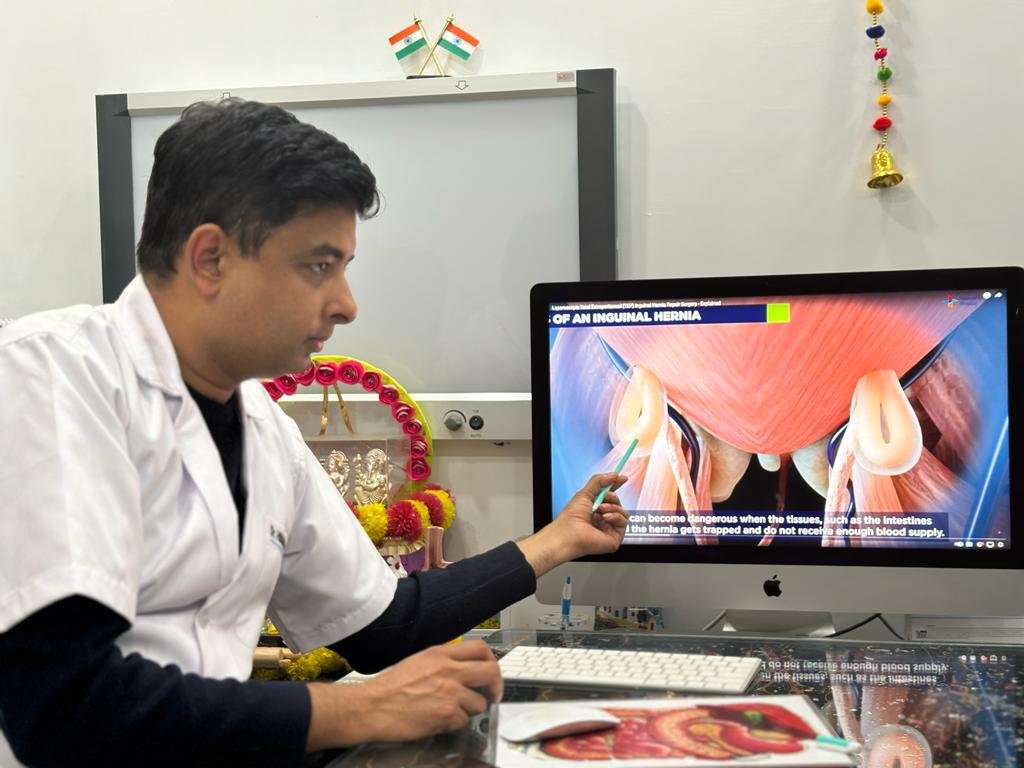
As we navigate the landscape of liver health in Agra, it’s imperative also to consider the expertise of hernia specialists. These medical professionals, explicitly trained in diagnosing and treating hernias, play a pivotal role in addressing this common abdominal condition.
What is a Hernia?
A hernia occurs when an organ or fatty tissue protrudes through a weak spot or tear in the surrounding muscle or connective tissue. This can lead to a visible bulge or lump, often accompanied by discomfort or pain. Hernias can develop in various body areas, including the abdomen, groin, and upper thigh.
Types of Hernias
Inguinal Hernia: This is the most common type of hernia and occurs when tissue protrudes through a weak spot in the abdominal wall, typically in the groin area. Inguinal hernias are more common in men and may cause pain or a visible bulge in the groin.
Femoral Hernia: Similar to inguinal hernias, femoral hernias also occur in the groin area but are more common in women. They happen when tissue protrudes into the canal that carries the femoral artery from the abdomen to the thigh.
Umbilical Hernia: This type of hernia occurs when tissue protrudes through the abdominal wall near the navel (belly button). Umbilical hernias are more common in infants but can also affect adults, especially those who are overweight or have had multiple pregnancies.
Hiatal Hernia: Unlike other types of hernias, hiatal hernias occur in the upper abdomen, where the stomach protrudes through the diaphragm into the chest cavity. Hiatal hernias can cause acid reflux, chest pain, and difficulty swallowing.
Causes of Hernias
Several factors can contribute to the development of hernias, including:
- Weakness in the abdominal wall muscles due to aging or injury
- Straining during bowel movements or urination
- Chronic coughing or sneezing
- Heavy lifting or strenuous physical activity
- Pregnancy and childbirth
- Obesity and excess weight
Symptoms of Hernias
The symptoms of a hernia can vary depending on the type and location but may include:
- A visible bulge or lump, especially when standing or straining
- Discomfort or pain, especially when coughing, lifting, or bending over
- A feeling of heaviness or pressure in the affected area
- Nausea or vomiting (in severe cases)
- Difficulty passing stools or urine (in severe cases)
- Redness, swelling, or tenderness around the hernia site
Diagnosis and Treatment
For an accurate diagnosis and the best course of action, you must speak with a healthcare provider as soon as you suspect you may have a hernia. Your doctor may perform a physical examination and recommend imaging tests such as ultrasound, CT scan, or MRI to confirm the diagnosis.
For individuals suspecting a hernia, seeking a prompt evaluation by a Hernia Specialist in Agra is crucial for accurate diagnosis and tailored treatment. A Hernia Specialist will conduct a thorough physical examination and may suggest additional diagnostic imaging tests like ultrasound, CT scan, or MRI to confirm the presence and severity of the hernia.
Treatment options for hernias may include
Watchful waiting: In some cases, especially with small or asymptomatic hernias, your doctor may recommend monitoring the condition and making lifestyle changes to prevent the hernia from worsening.
Hernia truss: A hernia truss is a supportive device to help hold the hernia in place and reduce discomfort. However, it is a short-term solution that may only suit some hernias.
Surgery: For more extensive or symptomatic hernias, surgery may be necessary to treat the weakened abdominal wall and reduce the risk of complications. Dr. Himanshu Yadav, a renowned surgeon specializing in hernia treatment in Agra, India, can perform minimally invasive procedures such as laparoscopic surgery, which involves smaller incisions and faster recovery times than traditional open surgery.
Conclusion
Hernias are a common medical condition that can cause discomfort and affect daily activities. Understanding hernias’ causes, symptoms, and treatment options is crucial for prompt diagnosis and appropriate management. Whether you have a small inguinal hernia or a more complex hiatal hernia, seeking medical advice from experts like Dr. Himanshu Yadav can help you find relief and improve your quality of life. Don’t ignore the signs of a hernia—take action and prioritize your health and well-being.
